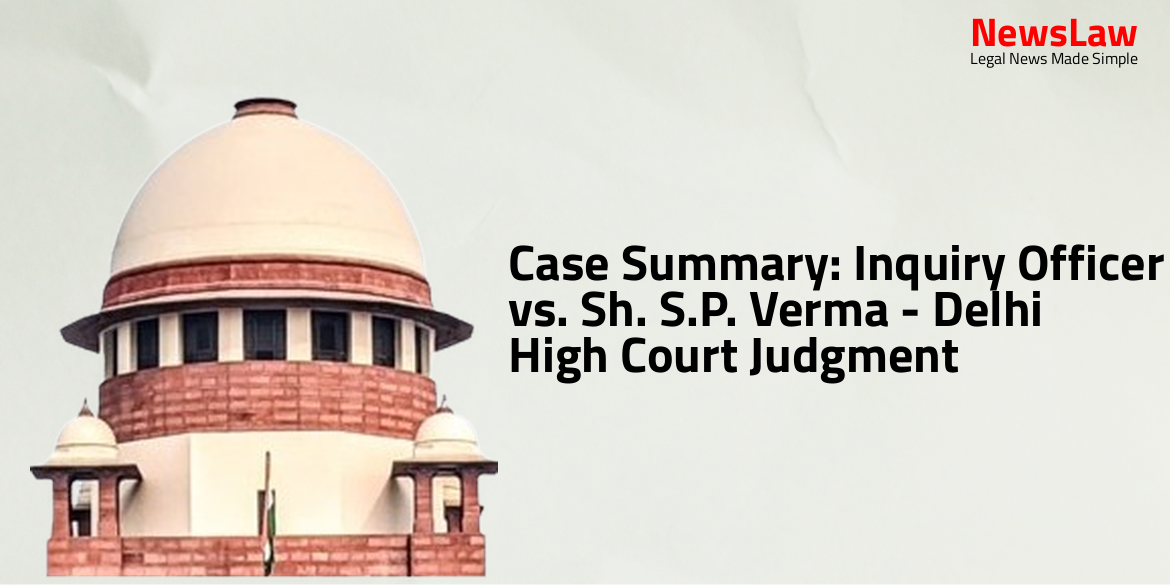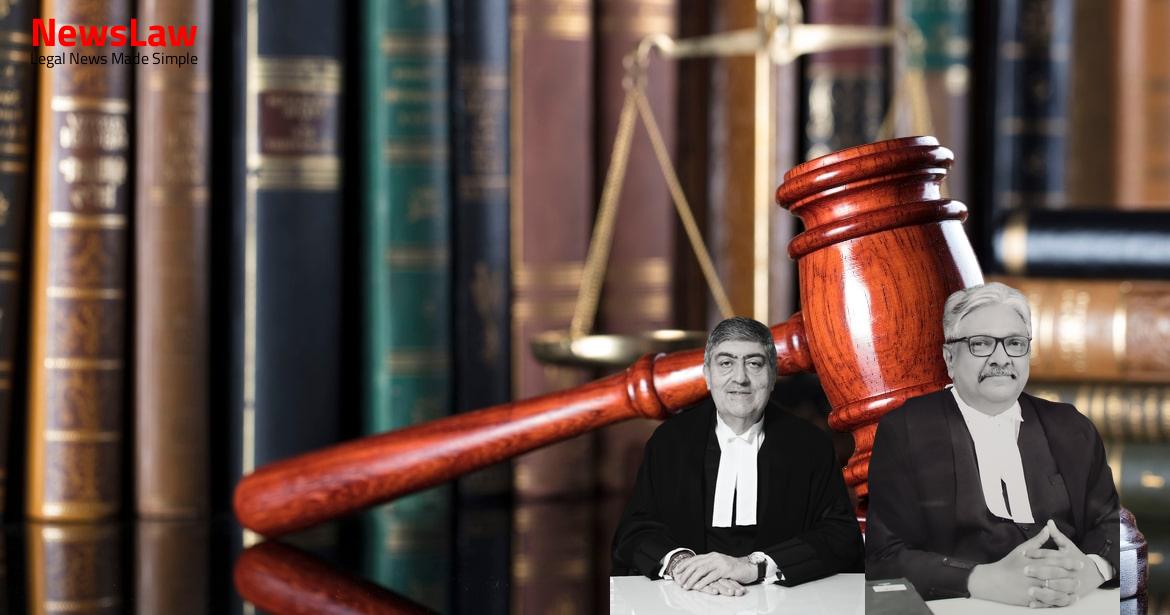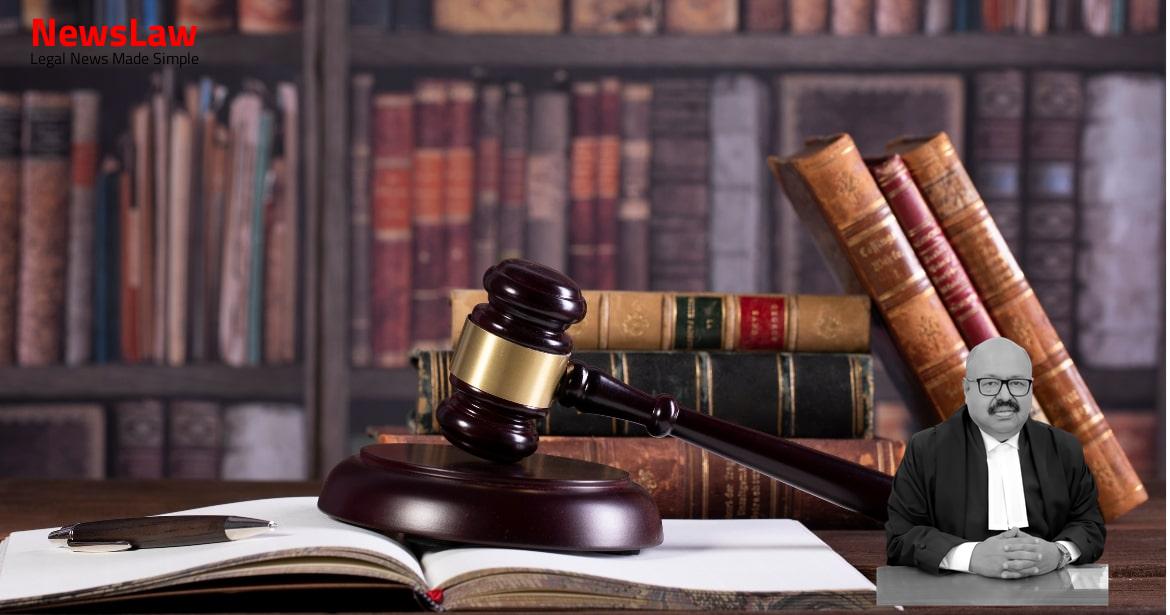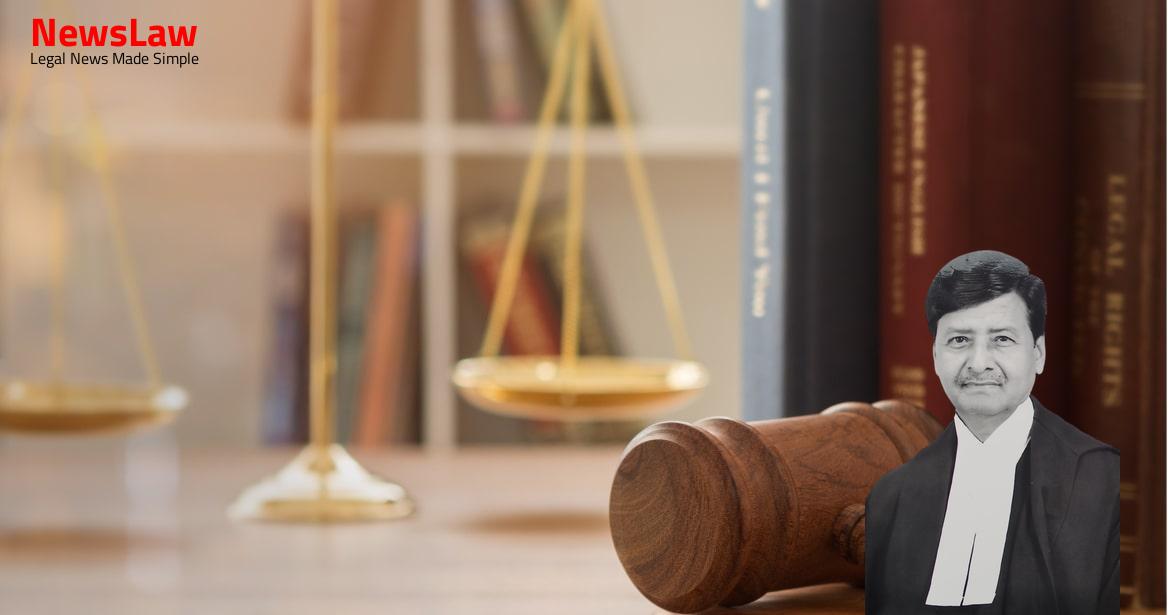In a recent legal development, the Delhi High Court addressed the case involving the Inquiry Officer and Sh. S.P. Verma. The court’s judgment explores the nuances of the disciplinary proceedings, analyzing the arguments presented by both parties. This blog post delves into the intricate details of the case and sheds light on the implications of the court’s decision on the involved parties. Stay tuned to unravel the complexities of this legal dispute.
Facts
- The petitioner received a notice of preliminary hearing from the Inquiry Officer dated 01.12.2011.
- The petitioner submitted a letter on 21.12.2011 to the IO listing sixteen official documents needed for defense.
- No one from M/s. KTC was summoned as a witness to verify the genuineness of documents disowned by the firm.
- The IO did not allow the petitioner to have assistance from Sh. S.P. Verma during the proceedings.
- The petitioner appeared before the IO accompanied by Sh. S.P. Verma, a retired Assistant Manager of the corporation.
- The writ petition under Article 226 of the Constitution of India was filed seeking various reliefs including award of costs.
Arguments
- The petitioner raised several contentions including issues related to the non-examination of officials from M/s. Kanani Trading Company, Jamnagar, who had lodged the complaint initiating the disciplinary proceedings.
- The petitioner argued that the complaint submitted by M/s. KTC, forming the basis of the allegations against him, was not proven in accordance with the law.
- It was highlighted that no officials from M/s. KTC were summoned as witnesses during the inquiry proceedings.
- The Articles of Charge against the petitioner were referenced in the argument to support the contention of lack of examination of relevant officials from M/s. KTC.
- The petitioner claimed that he had not provided any evidence to demonstrate efforts made to engage another employee from specific offices to assist him as a Defence Assistant.
- Petitioner argues that the complaint and documents relied upon were not proved or authenticated by the Investigating Officer (IO).
- No official from M/s. KTC was called as a witness, and there is no evidence against the petitioner presented at any stage of the inquiry proceedings.
- Citing cases like Moni Shankar Vs. Union of India & Another, Roop Singh Negi, and Hardev Singh Vs. State of U.P., Petitioner claims that reliance on these judgments is misplaced.
- The interpretation of Rule 31(7) by the Respondent is viewed as prejudicial to the petitioner’s case.
- The findings in the preliminary inquiry, being factual, are compared to Union of India and Others Vs. Mohd. Ibrahim as per the arguments of the learned senior counsel.
- The learned senior counsel prays for setting aside the impugned orders and allowing the petition.
Analysis
- The petitioner was granted a fair opportunity to defend himself and examine a witness on his behalf.
- Rule 31(12) allows the IO to question witnesses as deemed fit.
- The petitioner’s reliance on judgments did not support his case, especially concerning the disproportionality of the penalty of removal from service.
- The Disciplinary Authority provided plausible reasons for the charges against the petitioner.
- The petitioner failed to demonstrate his innocence and did not offer explanations for specific allegations.
- Courts may deny opportunities to summon specific witnesses in civil cases, subject to reasons.
- The petitioner was provided with ample opportunity to disprove the charges against him.
- The EDAP Rules specify the procedure for imposing minor penalties.
- The petitioner’s challenges regarding non-summoning of witnesses from M/s. KTC were addressed and found unjustified.
- The petitioner failed to explain lapses in procedure and non-compliance with established practices.
- The IO’s clarification and questioning of witnesses were deemed necessary and valid.
- The petitioner’s failure to engage a Defense Assistant despite opportunities was noted.
- The IO’s refusal to examine certain witnesses was justified based on sound reasons.
- The High Court should not act as a second court of appeal in disciplinary matters.
- Strict rules of evidence do not apply in domestic enquiries.
- Hearsay evidence can be considered if it has a reasonable nexus and credibility to the allegations.
- The findings of fact by the Disciplinary Authority are binding.
- The adequacy and reliability of evidence in disciplinary proceedings are not subject to judicial review.
- The imposition of penalty should not shock the conscience of the court.
- The Court/Tribunal’s interference is limited to ensuring procedural fairness and compliance with natural justice principles.
- Examination of material witnesses from M/s. KTC may not have prejudiced the petitioner’s case.
- The petitioner’s lack of experience does not excuse procedural lapses or misconduct.
- Judicial review in disciplinary matters is narrow and limited to procedural fairness and natural justice.
- The Inquiry Report had sufficient evidence to support the findings against the petitioner.
- The High Court/Tribunal cannot reappreciate the evidence in a disciplinary proceeding unless the penalty imposed is disproportionate or flawed.
- The High Court/Tribunal may call for reconsideration of the penalty if it shocks the conscience due to disproportionality.
- Only in exceptional circumstances, with cogent reasons, should the High Court/Tribunal impose a penalty itself.
- The doctrine of proportionality may be invoked by superior courts in some cases.
- Courts will interfere if principles of natural justice or statutory regulations are violated in disciplinary matters.
- Judicial review is not an appeal but a review of the decision-making process.
- Courts will not interfere with findings in departmental enquiries unless they are based on no evidence or are perverse.
- Disciplinary authorities have the discretion to impose appropriate punishment based on evidence and gravity of misconduct.
- Courts should not assume the function of the disciplinary authority unless there are procedural violations.
- High Court/Tribunal should not substitute its own penalty decision unless the imposed penalty shocks the conscience.
- The petitioner relied on the case of Managing Director, ECIL, Hyderabad and Others Vs. B. Karunakar and others reported in (1993) 4 SCC 727 against the Inquiry Report.
- The petitioner referenced the judgment in Raghubir Singh Vs. General Manager, Haryana Roadways, Hissar reported in (2014) 10 SCC 301 for the doctrine of proportionality, emphasizing that interference by the Court is warranted only when the penalty imposed is shockingly disproportionate to the charges or evidence.
- Another judgment cited by the petitioner is the case of Mohd. Ibrahim, where the Supreme Court concluded that basing the ultimate decision on statements made during preliminary inquiries would taint the proceedings.
- The judgment in Mohd. Ibrahim case is not applicable to the present case.
- There is no reason to interfere with the impugned orders dismissing the petitioner from service.
- The Inquiry Officer considered statements of witnesses and other documentary evidence apart from the preliminary inquiry.
Decision
- The court considered the arguments presented by both parties regarding the specific part of the judgement related to RPC.
- It analyzed the relevant laws and precedents applicable to the RPC in question.
- The court mentioned any specific provisions or clauses from the laws that were crucial to the RPC discussion.
- A detailed examination of the facts and evidence related to the RPC was conducted by the court.
- The court’s decision or findings regarding the RPC were outlined based on the analysis of the arguments, laws, and evidence presented.
Case Title: GYAN SINGH MEENA Vs. NATIONAL SEEDS CORPORATION LTD. AND ORS (2024:DHC:3764)
Case Number: W.P.(C)-3195/2014



